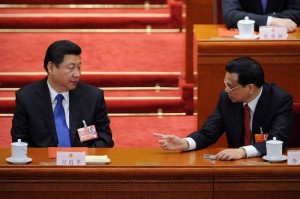Li Keqiang named China’s new premier

Chinese President Xi Jinping (L) talks with Chinese Vice Premier Li Keqiang (R) during the election of the new premier of China during the 12th National People’s Congress (NPC) at the Great Hall of the People in Beijing on March 15, 2013. China’s parliament installed bureaucrat Li Keqiang as premier on March 15, putting him in charge of running the world’s second-largest economy in a final step of a landmark power transition. AFP PHOTO /WANG ZHAO
BEIJING—China’s parliament installed bureaucrat Li Keqiang as premier Friday, putting him in charge of running the world’s second-largest economy in one of the final steps of a landmark power transition.
Li, who is expected to be in office for a decade, faces the challenge of steering the country towards more balanced development, with domestic consumption by a larger middle class playing a greater role.
“I announce that comrade Li Keqiang has been chosen as premier of the People’s Republic of China,” said Yan Junqi, a vice-chairwoman of the National People’s Congress (NPC), China’s rubberstamp parliament.
To applause from delegates in the Great Hall of the People in Beijing, Li stood up, bowed and shook hands with Xi Jinping, who was formally appointed as China’s new president Thursday, and his predecessor as premier Wen Jiabao.
Li received 2,940 votes out of 2,949 cast, with three votes against and six abstentions. Like Xi’s election the day before, the result had never been in doubt.
Li, Xi and other top leaders took charge of the Communist party, where real power lies, four months ago, and their stage-managed selection to the top government posts during this week’s NPC formalizes their authority.
Xi has more authority to set policy than Li. In the past the premier has been the face of government, making public appearances when disaster strikes and looking to reassure the public.
Both their terms officially last five years, but are normally followed by a second, totalling a decade in office.
Li, a 57-year-old English-speaking career bureaucrat, will oversee a sprawling portfolio of domestic and economic affairs.
He takes charge as China’s breakneck growth has steadily slowed and the need looms to rebalance away from investment and exports and towards domestic consumption.
In his position as one of Wen’s vice-premiers observers praised him for helping China navigate the global financial crisis and pushing forward efforts to restructure the economy.
But like Wen he may face resistance to change among the provinces and ministries.
Li will run the State Council, or cabinet, along with a number of vice-premiers — who will be named on Saturday — and state councillors, and will oversee several dozen ministries and commissions.
The son of a party official in the poor eastern province of Anhui, Li was sent to the countryside to do manual labor as were many youths during the tumultuous 1966-76 Cultural Revolution.
While overseeing central Henan province in the 1990s, he was criticized for dealing poorly with an HIV/AIDS epidemic that resulted from a tainted blood donation scheme, targeting activists and the media rather than officials.
He is expected to hold a rare press conference at the close of the NPC on Sunday.
Visible reaction to his election on China’s heavily-censored Twitter-like microblogs was generally positive, if limited.
One person took heart in Li having a doctorate in economics.
“Now we can look forward to how (he) will change our country’s development model and formulate a national development strategy from a global perspective,” wrote one poster under the name Han Wei.
Zhou Qiang, a former Communist party secretary of Hunan province who is seen as an associate of ex-leader Hu Jintao, was named president of China’s supreme court.
Legal specialists said Zhou could be an improvement over his predecessor, Wang Shengjun, a career official with no legal experience who said interests of the ruling Communist party came ahead of the constitution and the law.
“His legal education means he might place more emphasis on using the law,” said Pu Zhiqiang, one of China’s most celebrated human rights lawyers, who has represented dissident artist Ai Weiwei.
But he added: “Basically Zhou is a politician… whether he promotes the development of China’s legal system depends on other officials.”